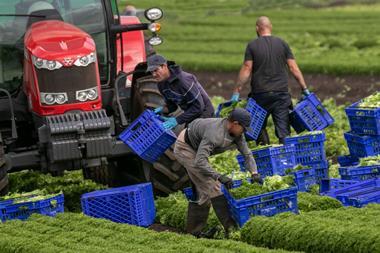
The NFU has called for a halt to proposed changes to rules requiring growers to pay the recruitment fees of workers.
The union said it feared the new rules could have a substantial financially damaging impact on farming and growing businesses.
New requirements to workforce audits run by industry standard the Supplier Ethical Data Exchange (Sedex), unveiled last week, will require UK farming and growing businesses to pay for the recruitment and transportation fees of the seasonal workers they employ.
However, the NFU said the changes should be paused until there was a proper industry consultation, alignment on how it would be fairly implemented and with the financial cost impacts and risks to farming and growing businesses fully understood.
“I am shocked that a decision such as this, which could have detrimental financial implications on our farmers and growers – already struggling with high input costs, extreme weather events and challenges in the supply chain – has been decided without the consultation of the people and businesses it will affect,” said Tom Bradshaw, NFU president.
Financial blow to farmers
He added that the change could mean “that many businesses are no longer commercially viable and will drive food price inflation”.
“We care deeply about the welfare of the skilled people who come to our country to help produce the nation’s food and many horticulture and poultry producers have high numbers of workers return to their businesses each year because they are so well valued,” he said.
The proposed changes come as new research into the UK government’s Seasonal Worker scheme confirmed that many migrant workers are taking on loans and debt in order to work in the UK.
According to the study from Focus on Labour Exploitation (FLEX), in collaboration with Rosmini Centre Wisbech, Citizen Advice South Lincolnshire, and the Southeast & East Asian Centre (SEEAC), some 72% of seasonal workers took out a loan to cover the costs of coming to the UK to work.
Additionally, 76.6% of workers surveyed reported earning less than they had been told they would earn.
The revelations follow mounting concerns over the past 12 months that many seasonal workers – particularly those recruited from Asia – are being exploited by unscrupulous overseas recruitment agents.
In a House of Lords committee meeting last year, Kate Roberts, head of policy at FLEX, said some workers were paying a minimum of £3,000 to travel to the UK to work. “We are basically asking workers to carry quite a lot of financial risk to travel here without any certainty about their earnings in the UK,” Roberts told peers.
Workers subject to ‘preventable risks’
“The findings of this research indicate that a large number of people on the scheme are being subjected to preventable risks, including risks of deception,” said Oliver Fisher, research manager at FLEX. “We know where the risk areas are on the visa route and the research backs up what we have been saying to government for years.”
The study is based on a sample of interviews and surveys with more than 400 workers and 15 key stakeholders collected over 17 months.
FLEX said that the combination of workers having to take on high migration costs, the insecurity caused by the short-term nature of the visa and workers having no guaranteed income for the duration of their visa, created a risk of debt bondage.
It added it also could exacerbate the power discrepancy between workers and their employers and scheme operators.
Many workers also reported mismatches in information concerning how much they would be earning, total costs they would have to pay and their hours of work.
In addition, many workers reported recieving contracts in a language they didn’t understand.
FLEX said many of these issues highlighted in its ‘Bearing fruit: Making recruitment fairer for migrant workers (2024)’ report could be traced back to the rapid expansion of the visa route, combined with a current low level oversight of overseas recruitment practices.



















No comments yet